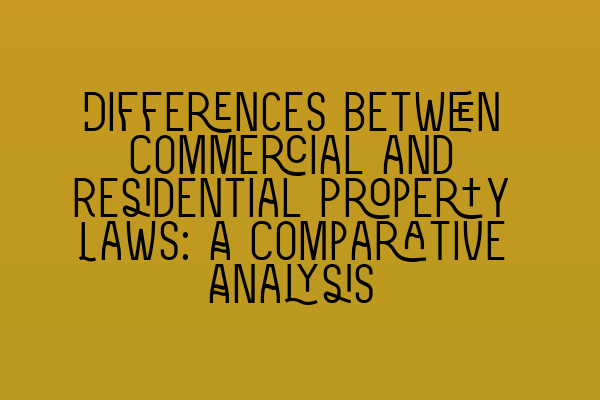Differences Between Commercial and Residential Property Laws: A Comparative Analysis
When it comes to property law, there are significant differences between commercial and residential properties. These distinctions are crucial to understanding the legal framework governing each type of property investment. Whether you are a property owner, tenant, or investor, having a clear grasp of these disparities is essential for navigating the complexities of property transactions, contracts, and disputes.
In this article, we will conduct a comparative analysis of commercial and residential property laws, shedding light on the key differences between them and the implications for property owners, tenants, and legal professionals. So, let’s dive in!
1. Definitions and Purpose
Commercial properties, as the name suggests, are specifically intended to facilitate business activities. They include office buildings, retail spaces, industrial warehouses, hotels, and other properties used for commercial purposes. On the other hand, residential properties are primarily designed for residential use, such as houses, apartments, condominiums, and townhouses.
The purpose of commercial and residential properties sets the foundation for the disparate legal frameworks surrounding them. Commercial property laws focus on factors like zoning, land use regulations, landlord-tenant relationships, leasing agreements, environmental considerations, and business-specific regulations. Residential property laws, however, center around issues like tenant rights, lease agreements, property maintenance, eviction procedures, and housing regulations.
2. Lease Agreements
One of the key distinctions between commercial and residential property laws lies in the lease agreements governing them. Commercial lease agreements are typically more complex and comprehensive than residential lease agreements. This is due to the intricate nature of commercial business operations and the extended duration of commercial leases. Commercial leases often involve detailed clauses regarding rent calculations, maintenance responsibilities, property improvements, subletting, and dispute resolution mechanisms.
In contrast, residential lease agreements tend to be more straightforward, focusing on essentials like rent amount, lease duration, maintenance responsibilities, and tenant rights. However, it is important to note that both commercial and residential lease agreements are legally binding contracts, and violating the terms can result in legal action. Understanding the unique provisions and obligations within these agreements is crucial for both property owners and tenants.
To delve deeper into the realm of lease agreements, check out our article on Misrepresentation in Contracts: Unveiling Deceptive Practices.
3. Property Use and Rights
Commercial property laws typically prioritize the interests of businesses and commercial enterprises, as they are vital contributors to the economy. These laws grant property owners and tenants greater flexibility in terms of property use and modification. However, commercial properties need to comply with various regulations, such as planning permissions, health and safety requirements, accessibility regulations, and business licensing.
On the other hand, residential property laws are primarily concerned with protecting the rights and well-being of individuals and families. These laws aim to ensure the availability of safe and habitable housing, protect tenants against unfair eviction, and regulate rent increases. Residential property owners and landlords must adhere to specific regulations regarding property maintenance, habitability standards, and tenant protections.
To gain a better understanding of the legal landscape surrounding commercial and residential leases, explore our article on SQE Contract Law: Analyzing Landmark Cases and Influential Judicial Decisions.
4. Property Disputes and Litigation
Property disputes can arise in both commercial and residential settings. However, the legal processes and considerations involved in resolving these disputes differ significantly.
Commercial property disputes often revolve around issues such as breach of contract, lease disputes, property damage, zoning violations, intellectual property infringements, and commercial tenancy issues. These disputes require specialized knowledge of commercial property laws and can involve complex litigation or alternative dispute resolution mechanisms, such as arbitration or mediation.
Residential property disputes, on the other hand, tend to focus on matters like breach of tenancy, rental disputes, eviction proceedings, maintenance issues, and tenant rights violations. In some cases, residential property disputes can be resolved through negotiation or by seeking guidance from local housing authorities, while others may require litigation in the county or district court.
5. Financing and Investment
The financing and investment landscape for commercial and residential properties also exhibit significant differences. Commercial property investments generally require more substantial capital and involve a higher level of risk. Lenders typically evaluate the viability and profitability of commercial projects based on factors like income potential, occupancy rates, market demand, and the financial stability of the business(es) operating within the premises.
Residential property investments, on the other hand, are typically considered more stable and less risky. Lenders evaluate these investments primarily based on factors like borrower creditworthiness, loan-to-value ratios, rental potential (in the case of buy-to-let properties), and market conditions.
To delve into the realm of contract law further, explore our article on A Closer Look at SQE Contract Law Syllabus.
Conclusion
Understanding the distinctions between commercial and residential property laws is fundamental for property owners, tenants, and legal professionals. From lease agreements to property use, dispute resolution to financing, these differences shape the legal landscape surrounding each type of property investment.
Whether you are involved in commercial real estate or residential property transactions, it is essential to consult legal professionals who specialize in property law. They can provide expert advice, draft contracts, handle disputes, and ensure compliance with the relevant regulations.
To broaden your knowledge of contract law, consider exploring our articles on Contract Law for Services: Key Considerations and Best Practices and Understanding Contractual Capacity: Rights and Limitations.
Disclaimer: The information provided in this article is for general informational purposes only and should not be construed as legal advice. For legal advice tailored to your specific situation, it is recommended to consult with a qualified solicitor.
